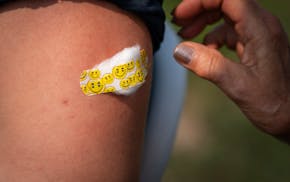A measles case reported at the University of Minnesota is drawing new attention to Minnesota vaccination laws and prompting state health officials to remind parents that although measles is officially eradicated in the United States, it remains a contagious and dangerous disease.
Mass vaccination campaigns have been particularly effective in Minnesota, where at least 93 percent of kindergartners received shots that protect against measles, mumps and rubella as of 2013-2014.
Even though that exceeds national averages, it still leaves one of every 14 children — about two in a typical public school classroom — unprotected. And the number of Minnesotans opting their children out of school-required vaccinations has risen slightly over the past decade.
At least one state lawmaker wants to tighten the state requirements. Under current law, parents can opt children out of vaccination for medical reasons if approved by doctors, or for philosophical reasons if they present notarized forms to their schools. But Rep. Mike Freiberg, DFL-Golden Valley, would require those parents to talk to a doctor first.
"Children are getting sick and being hospitalized because some parents do not understand the overwhelming evidence that vaccinations prevent serious illness," Freiberg said.
State health officials noted that even preventable viruses can storm back without sound public health measures.
"If we're not vigilant in making sure we're getting kids vaccinated, it certainly is possible we could have measles re-emerge," said Kris Ehresmann, who directs vaccination efforts for the Minnesota Department of Health.
Clusters of diseases such as chickenpox and whooping cough have emerged over the past decade, even though there are effective vaccines, Ehresmann said. Over the same period, Minnesota saw a rise in the number of families opting out of child vaccination requirements. The number of kindergartners opted out with a conscientious objection jumped from 607 in 2004-05 (less than 1 percent of those enrolled in public schools) to 1,959 (2.76 percent of enrollment) in the past school year, according to state health data.
While no vaccines are perfect, the measles vaccine is considered 95 to 98 percent effective. That, combined with the near-universal vaccination, makes a statewide outbreak unlikely, Ehresmann said. But communities with higher rates of vaccine objectors are a source of concern, she added.
Pine and Wadena counties are among those with measles vaccination rates at or below 90 percent due to high rates of objectors. And in Robbinsdale, five of the 10 kindergartners at the private Christian RiverTree School weren't vaccinated against measles last year due to objections, according to the state data.
"We're not exactly a tinderbox" for viral outbreaks, Ehresmann said. "On the other hand, there are pockets like this where it is problematic."
U student had traveled
The measles case involving the U of M student was unrelated to the outbreak that emerged before Christmas and infected 87 people in seven states — most of whom had visited Disneyland and were unvaccinated. The student had recently traveled abroad, university officials said.
The university's Boynton Health Service sent notices to about 2,500 students who might have had contact with the man in classes or at the campus recreation center. Health officials aren't certain whether he was vaccinated. While the U requires new students to self-report that they have been vaccinated or have formally objected, Boynton doesn't retain that information long-term unless the students receive care from the campus health service.
In this instance, the student was treated at Fairview's University of Minnesota Medical Center. Ehresmann said the student has indicated that he was vaccinated, but the claim hasn't been verified.
Ehresmann said the new legislative proposal was not created by the Health Department but that it shares the department's "values" of increasing vaccination. The state requires that a family's conscientious objection form be notarized because the extra step gives parents time to think about the decision.
A notarized form is one thing, said Jerri Johnson of the Vaccine Safety Council of Minnesota advocacy group, but a requirement of a doctor's visit is "a ploy to create another hurdle."
Her organization raises concerns about vaccine safety that public health officials generally regard as unfounded. Even with cases of infections such as measles emerging, parents should be able to make their own informed decisions about vaccination without excessive "interference," Johnson said. "Parents need to make decisions every day about risks and benefits for their children."
Jeremy Olson • 612-673-7744
![Leandro Goncalves celebrated Mr. Jagermeister win during Festival of Champions races at Canterbury Park Sunday September 1,2019 in Shakopee, MN.] Jerr](https://arc.stimg.co/startribunemedia/4Q7ZDLPTYGVMZ4XT4VAS4A342M.jpg?h=91&w=145&fit=crop&bg=999&crop=faces)
Canterbury Park: Entries, picks, results and more

What to know about the latest COVID variants, Minnesota testing, vaccines
Sign up for Star Tribune newsletters

